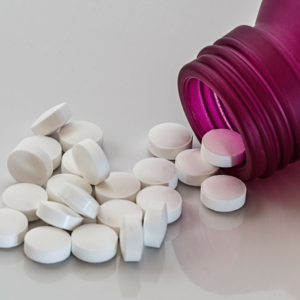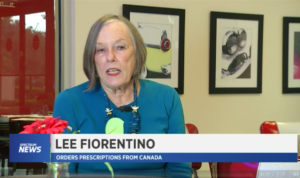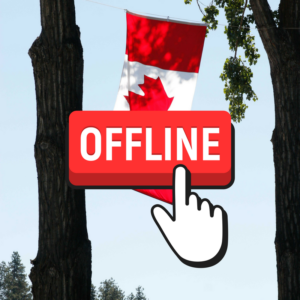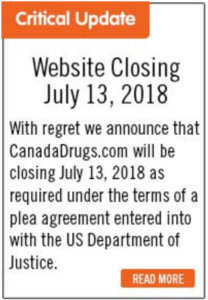by Gabriel Levitt, President, PharmacyChecker.com and Prescription Justice | Sep 28, 2018 | FDA enforcement
 This week, PharmacyChecker added information about Domperidone to our Domperidone drug price comparisons page to better educate people considering ordering this medicine. The product is also sold under the name “Domperidone Suspension” as well as the brand name “Motilium.” Exploring this drug and the U.S. Food & Drug Administration’s Expanded Access Program is key when looking at avenues of drug importation that are expressly permitted in the U.S. My aim in this post is to explain how this program works; differences of opinion about medical ethics related to Domperidone and other medications that may not be FDA-approved but are still of interest to doctors when treating their patients; and how this relates to the subject of personal drug importation overall.
This week, PharmacyChecker added information about Domperidone to our Domperidone drug price comparisons page to better educate people considering ordering this medicine. The product is also sold under the name “Domperidone Suspension” as well as the brand name “Motilium.” Exploring this drug and the U.S. Food & Drug Administration’s Expanded Access Program is key when looking at avenues of drug importation that are expressly permitted in the U.S. My aim in this post is to explain how this program works; differences of opinion about medical ethics related to Domperidone and other medications that may not be FDA-approved but are still of interest to doctors when treating their patients; and how this relates to the subject of personal drug importation overall.
Domperidone Treatment and Regulations in Different Countries
Domperidone is approved for sale in Canada and the United Kingdom, as well as other countries, but not the U.S. Unlike FDA-approved drugs sold in Canada and the UK, the FDA provides patients and their providers with a specific, permitted process to import Domperidone for personal use.
Domperidone is approved for sale in Canada for treating several gastrointestinal conditions; in the UK, it is only approved for the treatment of nausea and vomiting.
Domperidone increases lactation in breastfeeding mothers, but, due to serious potential side effects, it is not approved in any country for this purpose. However, in Australia and other countries, it is prescribed off-label to improve lactation. You can find an excellent discussion with points for and against this here: Off-label Prescribing of Domperidone
Expanded Access Programs
While the FDA has not approved it for sale in the U.S., Americans can access Domperidone under the federal agency’s Expanded Access Program. This program provides a permitted protocol to obtain drugs through an Investigational New Drug application (IND). Only FDA-approved drugs can be distributed in the U.S. INDs offer a path for drug companies who want to transport drugs that are not yet approved in the U.S. across state lines, usually for purposes relating to clinical trials of new drugs.
INDs are used by physicians to apply to the FDA to treat patients with Domperidone. While the FDA has not approved it for sale here, the FDA agrees that Domperidone may benefit people with severe gastrointestinal motility disorders when the potential benefits outweigh the risks.
Domperidone Risks
In 2004, with an import alert on Domperidone, the FDA very strongly came out against use of Domperidone for lactation and does not allow imports for that purpose. The agency also stopped compounding pharmacies from making and dispensing the drug domestically. The FDA states that the drug substantially increases the risk of cardiac problems, which outweigh the benefits (including aiding lactation). Interestingly, as recently as 2015, the Pharmacy Compounding Advisory Committee met with the FDA to try and change the agency’s mind to allow them to compound Domperidone. The request was denied.
Here’s a general overview of the program to obtain Domperidone. Detailed instructions for this process are contained in the FDA’s Domperidone IND Packet.
Domperidone Importation Exceptions
The FDA’s communications about this program are to physicians, patients and pharmacies – but patients cannot act without their providers. Unlike personal drug importation of FDA-approved drugs or foreign versions of FDA-approved drugs, to obtain drugs under the Expanded Access Program requires the participation of U.S. physicians, U.S. pharmacies, and the overseas manufacturers of the drugs.
The FDA has identified one pharmacy, called Dougherty’s Pharmacy, with two locations in Dallas, TX that is permitted to import and distribute Domperidone. It’s not clear why there is only one company involved. The FDA communicates that other pharmacies can apply to distribute Domperidone.
The FDA does not permit physicians and their patients to use the program to import Domperidone for breastfeeding mothers having problems with lactation. Recall, it’s also not approved for that purpose in Canada or the UK – or anywhere. However, in Australia, it’s prescribed off-label for this purpose. Off-label prescribing is when a provider writes a prescription for a patient to treat a condition with a drug that has not been approved by the FDA (in the U.S.) for that condition. Off-label prescribing is both legal and very common in the U.S., although controversial. According to WebMD, 20% of prescriptions are written off-label.
Physicians are allowed to prescribe medication off-label based on their medical judgement. I believe that would include Domperidone. One doctor, Juliet Mavromattes, MD, makes a case for why it would be medically unethical to prescribe Domperidone for lactation in the U.S. – but OK for GI disorders, per FDA’s guidance. Here’s a vehement defense of prescribing Domperidone to improve lactation from a pediatrician in Canada.
Safety When Buying Domperidone Online
If you do choose to buy Domperidone online from another country, be careful who you buy from. There are a lot of websites who will offer to sell this drug without a prescription. Many such sites are dangerous to order from. You can be more certain of obtaining the right medicine, dispensed by a licensed pharmacist, if you stick to ordering Domperidone from an online pharmacy verified through the PharmacyChecker Verification Program.
Prices for Domperidone 10mg range from 16 cents to 49 cents a pill: for 200 pills, that’s $32 vs. $98. The online pharmacies will likely decline to dispense it for lactation from certain countries, including Canada, but may do so from Australia where the drug is prescribed off-label.
FDA’s Path to Safe Personal Drug Importation
As this relates to personal drug importation overall, it’s interesting to note the reasoning the FDA provides for permitting it. Here are some highly relevant excerpts from the FDA’s website:
“The Expanded Access program facilitates availability of investigational drugs (such as Domperidone) to patients with serious diseases or conditions when there is no comparable or satisfactory alternative therapy to diagnose, monitor, or treat the patient’s disease or condition.
“To help facilitate the IND process, FDA has developed this packet, which includes instructions, templates, checklists, a protocol outlining the treatment plan (multi-patient INDs only), and summary of regulatory requirements. As sponsors of an active IND, physicians can prescribe Domperidone to qualifying patients.”
In view of the FDA’s positions here on availability and access, it provides a lot of room to defend lack of access based on affordability. It also shows how the FDA could engage healthcare providers in assisting patients with safe personal drug importation of FDA-approved drugs and foreign versions of FDA-approved drugs. For example, a doctor could fill out a form, similar to the one used to obtain Domperidone, to help a patient import a drug from Canada that the patient can’t afford domestically.
We know that doctors, nurse practitioners, and physician assistants—ones that recommend use of PharmacyChecker-verified online pharmacies—are concerned about the FDA’s actions against personal imports. They would appreciate a more organized pathway to help their patients obtain affordable drugs from Canada and overseas.
Tagged with: Domperidone, Expanded Access Program, imports
by Gabriel Levitt, President, PharmacyChecker.com and Prescription Justice | Aug 31, 2018 | FDA enforcement
 The FDA is warning 21 online pharmacies to stop selling certain prescription opioid drugs to people in the U.S.
The FDA is warning 21 online pharmacies to stop selling certain prescription opioid drugs to people in the U.S.
According to the FDA, the 21 websites at issue are operated by four separate networks:
CoinRx,
PharmacyAffiliates.org,
PharmaMedics,
and MedInc.biz.
Each network received a similar warning letter from the FDA, which singles out their alleged illegal sales of unapproved and misbranded tramadol, also noting that a prescription was not required.
(more…)
Tagged with: Enforcement, fentanyl, opioids, tramadol, warning letters
by Gabriel Levitt, President, PharmacyChecker.com and Prescription Justice | Aug 9, 2018 | FDA enforcement
 The FDA has made it it’s business to shine a bright light on the evils of illegal fentanyl imports, which are sometimes sold online. That focus seems like it’s a good one. Illegal fentanyl imports get into the hands of drug dealers who use the ingredients to make counterfeit, opioid-based drugs. They sell them to addicts who too often overdose and die. I’ve written a lot about the FDA’s crackdown on illegal fentanyl imports being misused to stop imports of prescription medicines on their way to American patients from Canada and other countries. However, something much more troubling actually has gone down over the past few years.
The FDA has made it it’s business to shine a bright light on the evils of illegal fentanyl imports, which are sometimes sold online. That focus seems like it’s a good one. Illegal fentanyl imports get into the hands of drug dealers who use the ingredients to make counterfeit, opioid-based drugs. They sell them to addicts who too often overdose and die. I’ve written a lot about the FDA’s crackdown on illegal fentanyl imports being misused to stop imports of prescription medicines on their way to American patients from Canada and other countries. However, something much more troubling actually has gone down over the past few years.
According to documents obtained through a Freedom of Information Act request by the John’s Hopkins Bloomberg School of Public Health, the FDA ignored information about off-label prescribing of the most dangerous prescription opioid drugs: fast-acting fentanyl or transmucosal immediate release fentanyl (TIRF). Those drugs were approved to treat the most serious pain experienced by cancer patients. Instead, drug companies encouraged off-label prescribing for patients experiencing lower levels of pain and certainly did not have terminal illnesses.
(more…)
Tagged with: Enforcement, fentanyl, opioids
by Gabriel Levitt, President, PharmacyChecker.com and Prescription Justice | Jul 26, 2018 | FDA enforcement

Click here to watch Lee tell her story
This week I’m highlighting a troubling local news story from earlier this month about the FDA seizing medicine imports from patients. Imports of medicines for personal use are under most circumstances prohibited under federal law, but millions have relied on the international pharmacy option for years. In fact, most medicines that Americans import to save money reach their destination. Recently, it seems there is a slight uptick in seizures, one that may be a casualty in the battle to stop dangerous opioid drugs. Or, like drug companies, the FDA is using the opioid crisis as a pretext to crack down on safe personal drug importation.
The report, on Spectrum News 13, comes out of Central Florida where hundreds of customers of The Canadian Medstore, a pharmacy assistance office, have said that the FDA has taken and held medicine imports shipped by mail. The FDA has received $94 million in additional funding to address the opioid crisis, including stopping illegal imports of opioid drugs, most prominently Fentanyl, which is known to be illegally imported from China. However, according to the Spectrum News report, the imports that the FDA is refusing are for regular medicines that treat maintenance conditions such as asthma, high blood pressure, and high cholesterol. The Canadian Medstore states that it does not sell prescription opioids or controlled substances of any kind.
This company was the subject of an FDA raid last fall, one that seemed overzealous if not unwarranted, which I blogged about here. It appears that as part of an investigation, imported medicines were seized and tested by the FDA at the time. According to the FDA, the medicines contained the correct active ingredients in the correct amounts.
Members of Congress Defend Safe Personal Drug Importation
Senator Bill Nelson (D-FL) has written to the FDA to express his concern about what appears to be a more aggressive stance by the agency against people buying more affordable medicine internationally. Other lawmakers who have sent other letters of concern include Representatives Kathy Castor (D-FL) and Gus Bilirakis (R-FL). Senators Amy Klobuchar (D-MN) and Chuck Grassley (R-IA) have also sent a letter asking the FDA if they have changed the personal drug importation policy.
Patient Asks Why?
Lee Fiorentino, 72, suffers from asthma and COPD. She was interviewed as part of the Spectrum News report because her asthma medication was detained by the FDA. The reporter did an online price search on GoodRx for Ms. Fiorentina’s medicine and the cost was $338/month in the U.S., which is over six times higher than the $52/month she pays purchasing them internationally.
Ms. Fiorentino says: “I don’t understand why [the FDA] would want my asthma medication. It just seems like a strange thing to do.”
Indeed.
Tagged with: Bill Hepscher, Enforcement, Florida, imports
by Gabriel Levitt, President, PharmacyChecker.com and Prescription Justice | Jul 19, 2018 | FDA enforcement
 The online pharmacy, CanadaDrugCenter.com, which had been verified by PharmacyChecker, is no longer accessible over the Internet. At the end of June, the managers of the online pharmacy—and others owned by them, CanadaDrugPharmacy.com and CanadaDrugStop.com—informed PharmacyChecker that they were withdrawing from the PharmacyChecker Verification Program because they were going offline, but they did not tell us why.
The online pharmacy, CanadaDrugCenter.com, which had been verified by PharmacyChecker, is no longer accessible over the Internet. At the end of June, the managers of the online pharmacy—and others owned by them, CanadaDrugPharmacy.com and CanadaDrugStop.com—informed PharmacyChecker that they were withdrawing from the PharmacyChecker Verification Program because they were going offline, but they did not tell us why.
We still don’t know why, either, but I suspect it has to do with the U.S. government’s case against its owners dating back to 2007-2011.
(more…)
Tagged with: canadadrugcenter, canadadrugs, Enforcement
by Gabriel Levitt, President, PharmacyChecker.com and Prescription Justice | Jul 13, 2018 | FDA enforcement
 [UPDATE: Today (July 13th, 2018), CandaDrugs.com, and other sites it owns, such as JanDrugs.com, have stopped selling medicines to patients in the U.S. in accordance with an agreement with the U.S. Attorney in Montana. Below, please read to understand why this happened. Several stories in the media are reporting that the reason is that patients bought counterfeit drugs from the online pharmacy, which is not true.
[UPDATE: Today (July 13th, 2018), CandaDrugs.com, and other sites it owns, such as JanDrugs.com, have stopped selling medicines to patients in the U.S. in accordance with an agreement with the U.S. Attorney in Montana. Below, please read to understand why this happened. Several stories in the media are reporting that the reason is that patients bought counterfeit drugs from the online pharmacy, which is not true.
Bottom line, as I see it: a very well-run, safe, international online pharmacy was forced by the U.S. government to stop helping Americans afford prescription drugs because the pharmaceutical industry wanted that outcome.
It’s a shame and American patients struggling with prescription costs are worse off for it.]
[FIRST PUBLISHED APRIL 13, 2018]
In a plea bargain signed today with the U.S. Department of Justice, the owners of CanadaDrugs.com are forfeiting their website www.CanadaDrugs.com and other websites they operate to the U.S. government. This is an unfortunate outcome of a case that did not involve medication sales of the popular website CanadaDrugs.com, which has been safely selling medication at low cost to Americans for many years. The case involved a separate wholesale business conducted by the owners of the website. Sadly, two counterfeit batches of the cancer medication, Avastin, entered the supply chain of that wholesale business in 2011 and were sold to medical offices in the U.S. To be clear, Avastin was never sold on the CanadaDrugs.com website.
For some balance and context: in the past, CVS and CVS.com were found to be selling counterfeit Lipitor, yet this did not lead to CVS having to forfeit its website to the U.S. government.
CanadaDrugs.com had been a verified member of the PharmacyChecker Verification Program since 2005. During that time, it likely processed millions of prescriptions and filled them from licensed pharmacies in Australia, Canada, New Zealand and the United Kingdom. We have verified the licenses of these pharmacies. CanadaDrugs.com voluntarily withdrew from our program in March, aware of the pending deal with the U.S. government. The FDA recognizes that there is no urgency to shutting down CanadaDrugs.com, giving them 90 days to wind down their international retail pharmacy business. In fact, CanadaDrugs.com remains a licensed pharmacy in Manitoba, Canada.
It was necessary for the FDA to investigate and act to prevent medication from being illegally sold at a wholesale level into the U.S. The enforcement discretion used by the FDA for personal importation never extended to those who illegally import and resell medication. We at PharmacyChecker have never condoned such sales. However, the deal struck is likely to do more harm than good by shuttering a good online pharmacy that was operating safely. Making matters worse, this case has been and continues to be used by the pharmaceutical industry to fuel a campaign carried out by its front groups to scare Americans and stop them from buying lower cost, safe and effective medications from pharmacies in other countries.
Interestingly, just as the indictment in this case was slated for release in February of 2015, I sent a report to the members of congress most responsible for regulating the FDA called: “Online Pharmacies, Personal Drug Importation, and Public Health: Ill-Considered Enforcement Prevents Access to Safe and Affordable Medication.” Basically, it was my attempt to explain, with rigorous analysis and research, why shutting down the safest international online pharmacies is bad for public health. It was bad policy then and it remains so now with tens of millions of Americans not filling prescriptions each year because of cost.
Tagged with: avastin, canadadrugs, Enforcement
 This week, PharmacyChecker added information about Domperidone to our Domperidone drug price comparisons page to better educate people considering ordering this medicine. The product is also sold under the name “Domperidone Suspension” as well as the brand name “Motilium.” Exploring this drug and the U.S. Food & Drug Administration’s Expanded Access Program is key when looking at avenues of drug importation that are expressly permitted in the U.S. My aim in this post is to explain how this program works; differences of opinion about medical ethics related to Domperidone and other medications that may not be FDA-approved but are still of interest to doctors when treating their patients; and how this relates to the subject of personal drug importation overall.
This week, PharmacyChecker added information about Domperidone to our Domperidone drug price comparisons page to better educate people considering ordering this medicine. The product is also sold under the name “Domperidone Suspension” as well as the brand name “Motilium.” Exploring this drug and the U.S. Food & Drug Administration’s Expanded Access Program is key when looking at avenues of drug importation that are expressly permitted in the U.S. My aim in this post is to explain how this program works; differences of opinion about medical ethics related to Domperidone and other medications that may not be FDA-approved but are still of interest to doctors when treating their patients; and how this relates to the subject of personal drug importation overall.

 The
The  The FDA has made it it’s business to shine a bright light on the evils of illegal fentanyl imports, which are sometimes sold online. That focus seems like it’s a good one. Illegal fentanyl imports get into the hands of drug dealers who use the ingredients to make counterfeit, opioid-based drugs. They sell them to addicts who too often overdose and die. I’ve written a lot about the FDA’s crackdown on illegal fentanyl imports being
The FDA has made it it’s business to shine a bright light on the evils of illegal fentanyl imports, which are sometimes sold online. That focus seems like it’s a good one. Illegal fentanyl imports get into the hands of drug dealers who use the ingredients to make counterfeit, opioid-based drugs. They sell them to addicts who too often overdose and die. I’ve written a lot about the FDA’s crackdown on illegal fentanyl imports being 
 The online pharmacy, CanadaDrugCenter.com, which had been verified by PharmacyChecker, is no longer accessible over the Internet. At the end of June, the managers of the online pharmacy—and others owned by them, CanadaDrugPharmacy.com and CanadaDrugStop.com—informed PharmacyChecker that they were withdrawing from the PharmacyChecker Verification Program because they were going offline, but they did not tell us why.
The online pharmacy, CanadaDrugCenter.com, which had been verified by PharmacyChecker, is no longer accessible over the Internet. At the end of June, the managers of the online pharmacy—and others owned by them, CanadaDrugPharmacy.com and CanadaDrugStop.com—informed PharmacyChecker that they were withdrawing from the PharmacyChecker Verification Program because they were going offline, but they did not tell us why.
